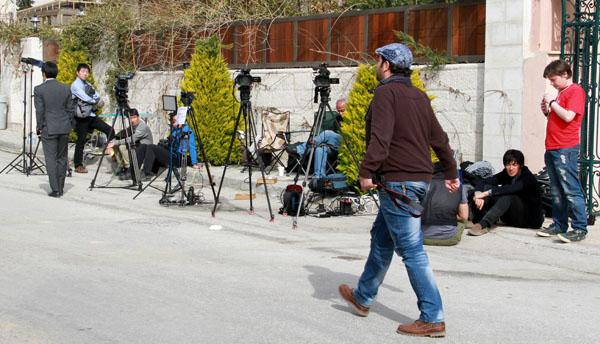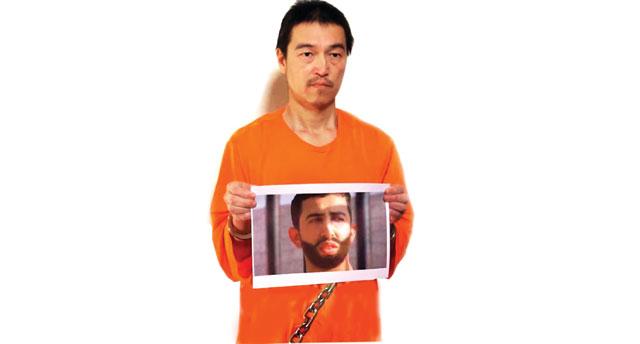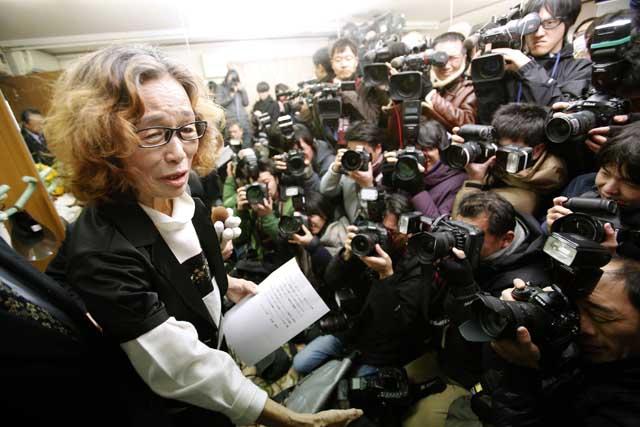You are here
Japan cooperating with Jordan to secure hostage’s release — official
By Khetam Malkawi - Jan 26,2015 - Last updated at Jan 26,2015

AMMAN — Japan is working to realise the immediate release of reporter Kenji Goto, who is held captive by the so-called Islamic State (IS) group, while obtaining the cooperation of relevant countries, including Jordan, Japanese Chief Cabinet Secretary Yoshihide Suga said Sunday.
“At the same time, Japan will not give in to terrorism. Our position of actively contributing to the counter-terrorism efforts by the international community remains unchanged,” Suga told reporters, according to a transcript of the press conference made available to The Jordan Times.
A video released by the terrorist group on Saturday purportedly shows Goto saying that he will not be killed if would-be suicide bomber Sajida Rishawi is released by Jordanian authorities.
A photo was also released on the same day showing Haruna Yakuwa, the other Japanese national who had been captured by IS, decapitated.
Rishawi is an Iraqi woman who was captured in connection with a failed suicide bombing in one of the three hotels targeted in the Amman 2005 bombings.
She was supposed to detonate an explosive belt after another terrorist blew himself up, in an orchestrated Al Qaeda attack that killed more than 60 people. Rishawi is currently on death row.
Suga refused to disclose any details on what Japan and Jordan are discussing in connection with the swap.
“This is still an ongoing matter. Japan will pursue every possible means, first and foremost, to save the life of Mr Goto. Furthermore, our position on the matter of terrorism remains completely unchanged,” he added, highlighting Jordan and Japan’s “extremely amicable relations”.
“His Majesty King Abdullah visited Japan last year and the prime minister [Shinzo Abe] visited Jordan this month. In this sense, I would like to reiterate that Japan and Jordan have extremely close ties,” he added.
Reports and analysts had expected that IS would demand the release of Rishawi and another detained Iraqi terrorist, Ziad Al Karboli, in return for detained Jordanian pilot Muath Kasasbeh, who was taken hostage late last year when his plane crashed in Syria.
Stressing that Jordan and Japan share deep ties, Mamoun Abu Nuwar, a military expert, said Jordan might negotiate for the release of Kasasbeh along with the Japanese hostage in exchange for Rishawi.
He said there has been a “dramatic change” in the IS attitude, as they decided to change their demands from a $200 million ransom to the release of Rishawi, although “they need money” after the drop in the price of oil, which is a main source of their income.
The Kingdom last year released Libyan prisoner Mohammad Dersi, who was serving a life sentence imprisonment in Jordan for plotting to carry out a bombing attack against Queen Alia International Airport in 2006, as part of a swap deal to release Jordan’s ambassador to Libya Fawaz Aitan.
Aitan was kidnapped by an armed group in Libya in April 2014.
Meanwhile, the Jihadi Salafist movement in Jordan denied as baseless news reports claiming that they can negotiate with IS for the release of Kasasbeh and the Japanese hostage.
Mohammad Shalabi, or Abu Sayyaf, head of the Jihadi Salafist movement, told The Jordan Times that there is no contact between the movement and IS.
“There are members of the movement who know members of IS, but there is no coordination or any connection with them at the group level,” Abu Sayyaf said.
In remarks to The Jordan Times on Saturday, one of the Japanese journalists who came to Amman to follow up on the kidnap of Goto said the Japanese people hope that the Jordanian government will help in the release of their fellow citizen.
Yusuke Ibi, who works for Tokyo Broadcasting System, said: “Most of the Japanese people hope that the Jordanian government can release Rishawi to save Goto.”
He added that although the Japanese know about IS, they never expected that the group would affect them.
Japan set up an operations room in Jordan last week to deal with the kidnapping. The operations room is headed by Japan’s State Minister for Foreign Affairs Yasuhide Nakayama, an embassy official told The Jordan Times.
Related Articles
Authorities were verifying the authenticity of a video recording released on Tuesday, in which the so-called Islamic State (IS) threatened to kill Jordanian pilot Muath Kasasbeh and Japanese hostage Kenji Goto if Jordan does not release convicted terrorist Sajida Rishawi within 24 hours.
Jordan on Sunday strongly condemned the killing of Japanese hostage Kenji Goto by the so-called Islamic State (IS), while Japan thanked Jordan for its support during the crisis.
Authorities were on Saturday verifying the authenticity of a video purporting to have been released by the Islamic State (IS), announcing it had killed one of two Japanese hostages they were holding and demanding that Jordan free an Iraqi female terrorist in return for the other hostage.


















